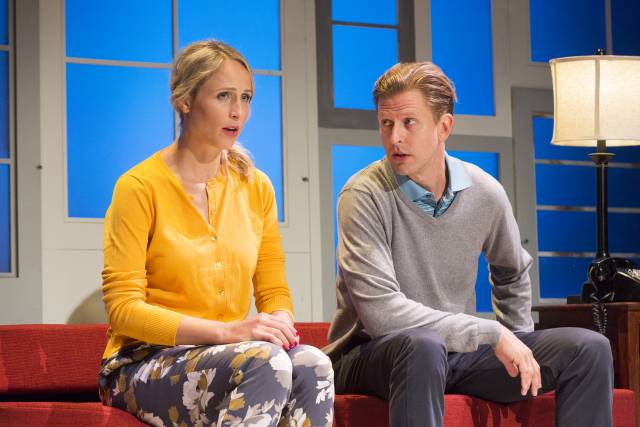

The essence of Laugh It Up, Stare It Down is summed up in its opening scene when Joe (Jayce Bartok) and Cleo (Katya Campbell) meet outside her apartment. After awkward flirtation, they end up together, and a mere few scenes later they are married. But in the very first scene, playwright Alan Hruska has established the game rules which come down essentially to our take on whether Joe is a lunatic or a romantic. Was this a chance meeting or something else altogether? If so, is there such a thing as “planned romance”? It’s no accident, and certainly no flaw, that throughout the brisk play we find our mind traveling back to the first scene, trying to find clues and possible solutions to the many problems the characters will face in the three-plus decades covered in the show.
Looking back it seems, can be both a blessing and a curse, and the faster the play becomes - entire decades pass by in second long transitions - the more we wish time would slow down, not within the play, for it is directed confidently and with pizzazz by the brilliant Chris Eigeman, but in life. In fact other than Joe, Cleo and a myriad supporting characters played wonderfully by Maury Ginsberg and Amy Hargreaves, time seems to be another character in the show, perhaps the leading player even.
There is a large chandelier placed right at the center of the stage that keeps descending from the ceiling with each scene transition. Needless to say that this causes a feeling of unease and anxiety, it works as one of the most effective memento moris used in contemporary theatre, for we can’t keep our eyes away from it, while wondering what will happen once it reaches the bottom. Are we in store for a time bomb or a reward? The scenic design by Kevin Judge embodies the duality of time to perfection, not only through the chandelier, but also with a backdrop composed of many doors and windows, which serve as exits and entries, but also adds to the theme of time flowing.
If Laugh It Up, Stare It Down sounds a bit ambiguous in its ideas, it’s only because Hruska isn’t one to make grand speeches about life, he’s interested instead in capturing the moments that make life worthy, whether they’re robberies, lost babies, terrible dinner dates, or heartbreaking infidelities. Those looking for answers to life’s troubles will undoubtedly find the play unfulfilling, but those aware of theatre’s ability to act as a mirror will not only be entertained, but will also be left empowered, knowing that once they leave the show, they have the choice to decide whether they will let the handsome stranger waiting somewhere out there, to sweep them off their feet, or not.